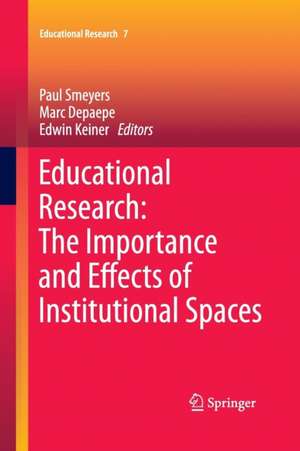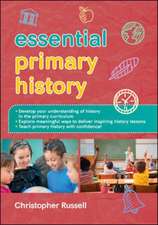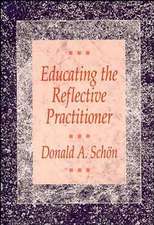Educational Research: The Importance and Effects of Institutional Spaces: Educational Research, cartea 7
Editat de Paul Smeyers, Marc Depaepe, Edwin Keineren Limba Engleză Paperback – 22 mai 2015
The chapters address various topics relating to the physical and geographical environment. How, for example, does geographical space shape researchers’ mental frameworks? How did the learning environments in which young children are taught today evolve? To what extent did parochialism shape America’s higher education system? How can our understanding of classroom practice be enhanced by concepts of space? The book acknowledges that texts themselves, as well as the research ‘arena’, are ‘spaces’ too, and notes the fascinating debate on the concept of space in the field of mathematics education. Indeed, as more and more students move online, the book analyses the rising importance of virtual spaces such as Web 2.0, which have major educational implications for researchers and students joining the innovative ‘virtual’ universities of the future.
This publication, as well as the ones that are mentioned in the preliminary pages of this work, were realized by the Research Community (FWO Vlaanderen / Research Foundation Flanders, Belgium) Philosophy and History of the Discipline of Education: Faces and Spaces of Educational Research.
| Toate formatele și edițiile | Preț | Express |
|---|---|---|
| Paperback (1) | 637.28 lei 6-8 săpt. | |
| SPRINGER NETHERLANDS – 22 mai 2015 | 637.28 lei 6-8 săpt. | |
| Hardback (1) | 643.48 lei 6-8 săpt. | |
| SPRINGER NETHERLANDS – 16 apr 2013 | 643.48 lei 6-8 săpt. |
Preț: 637.28 lei
Preț vechi: 749.73 lei
-15% Nou
Puncte Express: 956
Preț estimativ în valută:
121.96€ • 127.17$ • 101.36£
121.96€ • 127.17$ • 101.36£
Carte tipărită la comandă
Livrare economică 21 martie-04 aprilie
Preluare comenzi: 021 569.72.76
Specificații
ISBN-13: 9789400794344
ISBN-10: 9400794347
Pagini: 232
Ilustrații: VIII, 221 p.
Dimensiuni: 155 x 235 x 12 mm
Greutate: 0.33 kg
Ediția:2013
Editura: SPRINGER NETHERLANDS
Colecția Springer
Seria Educational Research
Locul publicării:Dordrecht, Netherlands
ISBN-10: 9400794347
Pagini: 232
Ilustrații: VIII, 221 p.
Dimensiuni: 155 x 235 x 12 mm
Greutate: 0.33 kg
Ediția:2013
Editura: SPRINGER NETHERLANDS
Colecția Springer
Seria Educational Research
Locul publicării:Dordrecht, Netherlands
Public țintă
ResearchCuprins
1. Exploring a multitude of spaces in education and educational research.- 2. American democracy and Harold D. Lasswell: Institutional spaces of ‘failure’ and ‘success’, present and past.- 3. The power of the parochial in shaping the American system of Higher Education.- 4. Crossing the Atlantic to gain knowledge in the field of psycho-pedagogy: The 1922 mission of Ovide Decroly and Raymond Buyse to the USA and the travel diary of the latter.- 5. The emergence of institutional educational spaces for young children: In pursuit of more controllability of education and development as part of the long-term growth of educational space in history.- 6. A different training, a different practice. Infant care in Belgium in the interwar years in the city and in the countryside.- 7. Disability, rehabilitation & the Great War: Making space for silence in the History of Education.- 8. Interpretation: The space of text.- 9. Exploring educational research as a multi-layered discursive space.-10. The spaces of mathematics: Dynamic encounters between local and universal.- 11. The classroom space: A problem or a mystery?- 12. Spaces and places in the virtual university.- 13. Material contexts and creation of meaning in virtual places: Web 2.0 as a space of educational research. 14. From entrepreneurialism to innovation: Research, critique, and the Innovation Union.- 15. About the Authors.- Index.
Recenzii
Institutional spaces and places: what we do in them and what they do to us? Paul Smeyers, Marc Depaepe and Edwin Keiner have assembled a rich and varied collection, in which leading historians and philosophers of education bring much-needed critical attention to these matters. Covering the local and the universal, the concrete and the virtual, the metaphorical and the metaphysical, these essays challenge received assumptions and press questions of policy and practice in such a way as to chart new possibilities for educational research.
Paul Standish, Institute of Education, London, United Kingdom
If we consider that both 'education' and 'research' have become crucial myths in modern societies, the role and significance of 'educational research' cannot be underestimated. Smeyers, Depaepe and Keiner present a collection of essays that illuminate the sometimes subtle effects of institutional spaces on the practices and meanings of educational research. The wide rangeof practices and contexts addressed in this volume as well the analytical depth of the contributions makes this volume a major reference for all scholars interested in the critical dissection of 'educational research' as a scholarly practice.
Marcelo Caruso, Humboldt Universität zu Berlin, Institut für Erziehungswissenschaften, Berlin, Germany
Paul Standish, Institute of Education, London, United Kingdom
If we consider that both 'education' and 'research' have become crucial myths in modern societies, the role and significance of 'educational research' cannot be underestimated. Smeyers, Depaepe and Keiner present a collection of essays that illuminate the sometimes subtle effects of institutional spaces on the practices and meanings of educational research. The wide rangeof practices and contexts addressed in this volume as well the analytical depth of the contributions makes this volume a major reference for all scholars interested in the critical dissection of 'educational research' as a scholarly practice.
Marcelo Caruso, Humboldt Universität zu Berlin, Institut für Erziehungswissenschaften, Berlin, Germany
Textul de pe ultima copertă
This collection of fresh analyses aims to map the links between educational theory and research, and the geographical and physical spaces in which teaching is practiced and discussed. The authors combine historical and philosophical perspectives in examining the differing institutional loci of education research, and also assess the potential and the limitations of each. The contributors trace the effects of ‘space’ on educational practice in the classroom, in the broader institutions, and in the academic discipline of education—doing so for a range of international contexts.
The chapters address various topics relating to the physical and geographical environment. How, for example, does geographical space shape researchers’ mental frameworks? How did the learning environments in which young children are taught today evolve? To what extent did parochialism shape America’s higher education system? How can our understanding of classroom practice be enhanced by concepts of space? The book acknowledges that texts themselves, as well as the research ‘arena’, are ‘spaces’ too, and notes the fascinating debate on the concept of space in the field of mathematics education. Indeed, as more and more students move online, the book analyses the rising importance of virtual spaces such as Web 2.0, which have major educational implications for researchers and students joining the innovative ‘virtual’ universities of the future.
This publication, as well as the ones that are mentioned in the preliminary pages of this work, were realized by the Research Community (FWO Vlaanderen / Research Foundation Flanders, Belgium) Philosophy and History of the Discipline of Education: Faces and Spaces of Educational Research.
The chapters address various topics relating to the physical and geographical environment. How, for example, does geographical space shape researchers’ mental frameworks? How did the learning environments in which young children are taught today evolve? To what extent did parochialism shape America’s higher education system? How can our understanding of classroom practice be enhanced by concepts of space? The book acknowledges that texts themselves, as well as the research ‘arena’, are ‘spaces’ too, and notes the fascinating debate on the concept of space in the field of mathematics education. Indeed, as more and more students move online, the book analyses the rising importance of virtual spaces such as Web 2.0, which have major educational implications for researchers and students joining the innovative ‘virtual’ universities of the future.
This publication, as well as the ones that are mentioned in the preliminary pages of this work, were realized by the Research Community (FWO Vlaanderen / Research Foundation Flanders, Belgium) Philosophy and History of the Discipline of Education: Faces and Spaces of Educational Research.
Caracteristici
A major contribution to the debate on institutional context in education research Challenges received notions in the applied philosophy and history of education Examines novel concepts of educational space such as online learning in Web 2.0


















